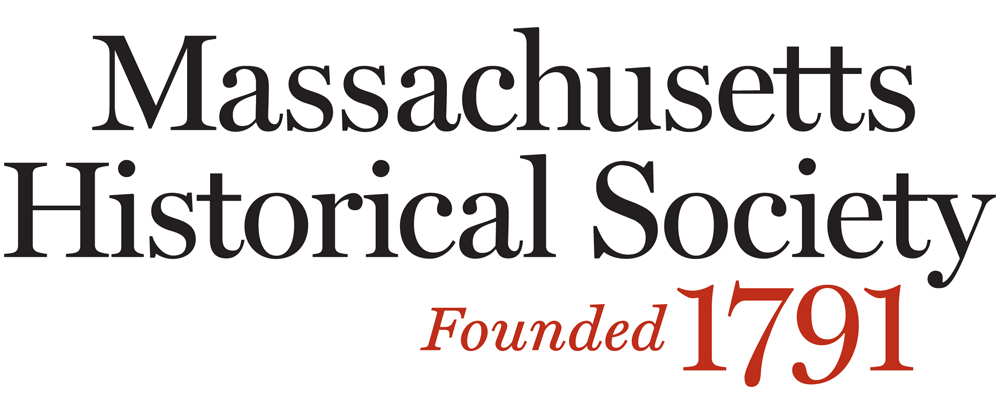from May. 16, 1865
Dr. Robert King Stone Testimony
-
Full Title
Dr. Robert King Stone Testimony
-
Description
Dr. Robert King Stone was the Lincoln family doctor and one of 350 witnesses to give an account of the events of April 14, 1865. Dr. Stone recounts his experience with the dying Lincoln on the night of the assassination. Stone includes a description of Lincoln's fate and the care he received in his final hours.
-
Transcription
Dr. Robert King Stone,
a witness called for the prosecution, being duly sworn, testified as follows:
By the Judge Advocate
Q. State to the Court if you are a practicing physician in this city?
A. I am.
Q. Were you, or not, the physician of the late President of the United States?
A. I was his family physician.
Q. State whether or not you were called to see him on the evening of his assassination, and the examination which you made and the result?
A. I was sent for by Mrs Lincoln immediately after the assassination. I arrived there in a very few moments and found that the President had been removed form the theatre to the house of a gentleman living directly opposite the theatre, had been carried into the back room of the residence, and was there placed upon a bed. I found a number of gentlemen, citizens, around him, and among others two assistant surgeons of the army who had brought him over from the theatre and had attended to him. They immediately gave over the case to my care, knowing my relations to the family. I proceeded then to examine him, and instantly found that the President had received a gunshot wound in the back part of the left side of his head, into which I carried immediately my finger. I at once informed those around that the case was a hopeless one; that the President would die; that there was no positive limit to the duration of his life; that his vital tenacity was very strong, and he would resist as long as any man could, but that death certainly would soon close the scene. I remained with him doing whatever was in my power, assisted by my friends, to aid him, but of course, nothing could be done, and he died the next morning at about half past seven o'clock. It was about a quarter past ten that I reached him.
Q. He died from that wound?
A. Yes, sir.
Q. Did you extract the ball?
A. Yes, sir. The next day, previous to the process of embalmment, with some medical friends, Dr. Curtis and Dr. Woodward of the Army, and in the presence also of Surgeon General, Dr. Barnes, the examination was made. We traced the wound through the brain, and the ball was found in the anterior part of the same side of the brain, the left side, - a large ball resembling those balls which are shot from the pistol known as the Derringer; an unusually large ball; that is, a larger ball than those used in the ordinary pocket revolvers.
Q. Was is a leaden ball?
A. Yes, sir, a hand made ball, from which the tag on the little end had been cut by hand. The ball was flattened somewhat, impressed in its passage through the skull, and a portion had been cut off in going through the bone. I marked the ball with the initials of the late President, and sealed it in the presence of the Secretary of War in his office, - sealed it with my private seal and endorsed it with my name. The Secretary enclosed it in another envelope which he endorsed in like manner and sealed with his private seal. It is still in his custody, and he ordered it to be placed among the archive of his department.
Q. Was the ball slightly flattened?
A. Yes, sir.
Q. Did you see the pistol?
A. No, sir, I did not. I may state that I marked the ball with the initials of the President, "A, L", so that I could recognize it instantly.
Q. [Exhibiting a ball to the witness.] Look at that ball and tell the Court whether it is the one which you extracted from the head of the President?
A. It is. I recognize the mark I put upon it with my penknife, "A. L", and the shape of the ball. This is the fragment of which I spoke, which was cut off in its passage through the skull. The ball was flattened as I described it to the Court.
[The ball was offered in evidence without objection, and is marked Exhibit No. 30.]
Q. You know nothing in regard to the pistol?
A. No, sir, I never saw it. -
Source
U.S. National Archives, Records of the Office of the Judge Advocate General (Army)
-
Rights
This item is in the public domain and may be reproduced and used for any purpose, including research, teaching, private study, publication, broadcast or commercial use, with proper citation and attribution.
-
Tags
-
Cite this Item
National Archives. "Dr. Robert King Stone Testimony". Remembering Lincoln. Web. Accessed October 31, 2025. https://rememberinglincoln.fords.org/node/1196
-
Creator
National Archives
-
Date
May 16, 1865
from May. 16, 1865
Dr. Robert King Stone Testimony
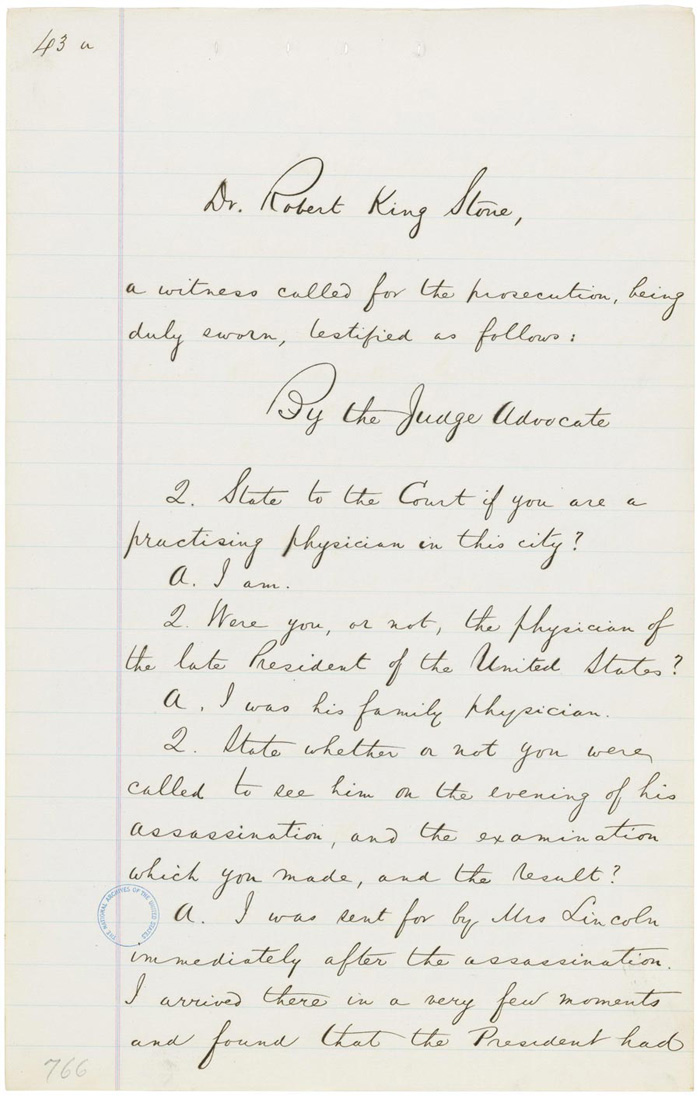
-
Description
Dr. Robert King Stone was the Lincoln family doctor and one of 350 witnesses to give an account of the events of April 14, 1865. Dr. Stone recounts his experience with the dying Lincoln on the night of the assassination. Stone includes a description of Lincoln's fate and the care he received in his final hours.
-
Source
U.S. National Archives, Records of the Office of the Judge Advocate General (Army)
-
Rights
This item is in the public domain and may be reproduced and used for any purpose, including research, teaching, private study, publication, broadcast or commercial use, with proper citation and attribution.
-
Creator
National Archives
-
Date
May 16, 1865
from Apr. 15, 1865
Lincoln Shirt Fragment
-
Full Title
Fragment of Abraham Lincoln's Shirt from the Night of His Assassination
-
Description
On April 15, 1865, a detail of six Union soldiers transported the body of Abraham Lincoln from the Petersen House to the White House, where a Union surgeon performed an autopsy. In recognition of the extraordinary task performed by these soldiers, their commander, General Daniel Rucker, cut six pieces of President Lincoln’s undershirt and gave a piece to each soldier. One of these soldiers was John C. Weaver from Schuylkill County, Pennsylvania, who was assigned to the Quartermasters Corps at the time of President Lincoln's assassination. Weaver's piece of Lincoln's undershirt was given to his granddaughter, Ellen Millen, who complied a collage that incorporated the cloth fragment, printed documentation about Weaver, photographs and annotations.
-
Source
The Abraham Lincoln Foundation of The Union League of Philadelphia (Object ID: 2007.1.1)
-
Rights
Use of this item for research, teaching and private study is permitted with proper citation and attribution, as “Courtesy of The Abraham Lincoln Foundation of The Union League of Philadelphia.” Reproduction of this item for publication, broadcast or commercial use requires written permission. For permission, please contact The Abraham Lincoln Foundation.
-
Tags
-
Cite this Item
Unknown. "Fragment of Abraham Lincoln's Shirt from the Night of His Assassination". Remembering Lincoln. Web. Accessed October 31, 2025. https://rememberinglincoln.fords.org/node/1000
from Apr. 15, 1865
Fragment of Abraham Lincoln's Shirt from the Night of His Assassination
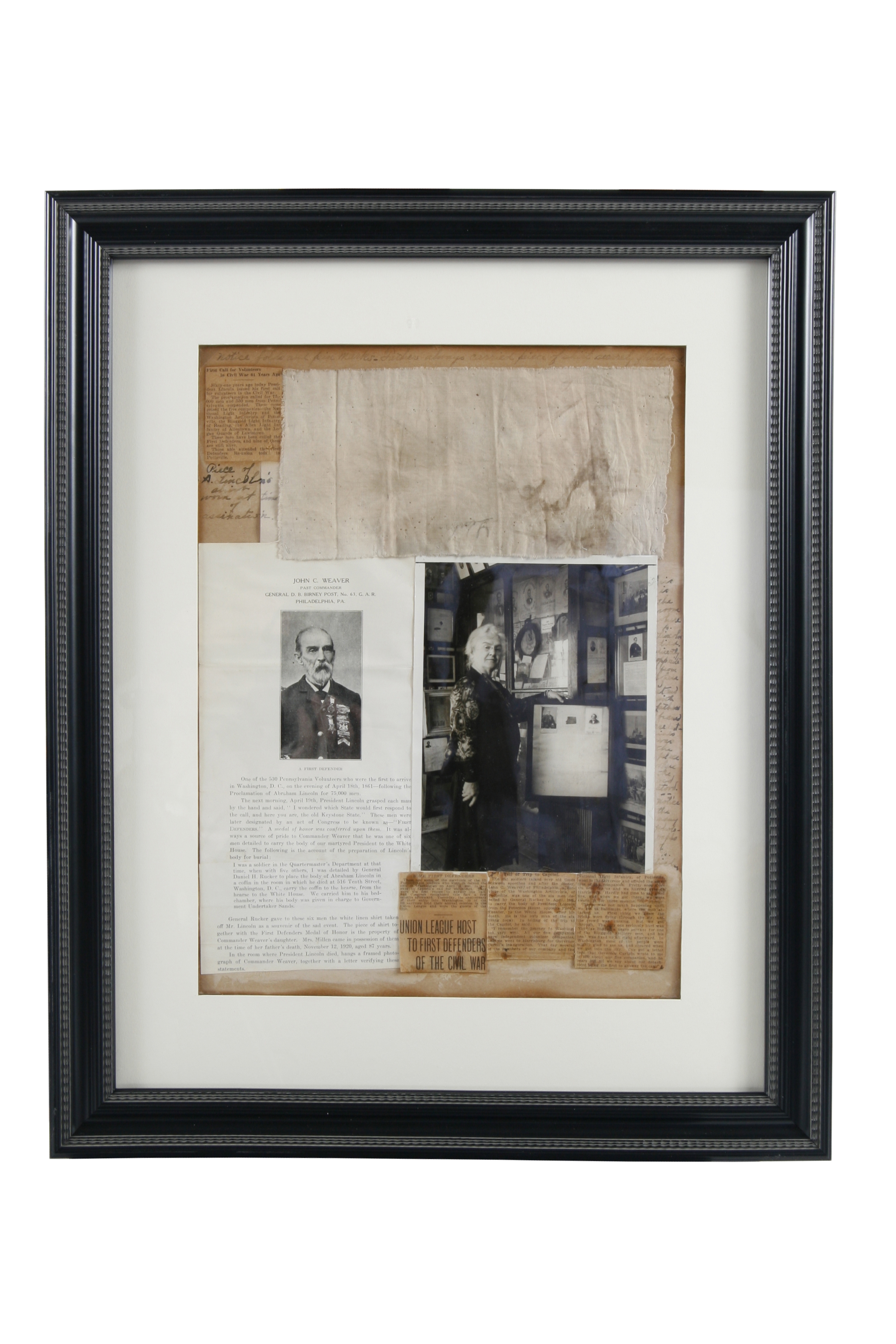
-
Description
On April 15, 1865, a detail of six Union soldiers transported the body of Abraham Lincoln from the Petersen House to the White House, where a Union surgeon performed an autopsy. In recognition of the extraordinary task performed by these soldiers, their commander, General Daniel Rucker, cut six pieces of President Lincoln’s undershirt and gave a piece to each soldier. One of these soldiers was John C. Weaver from Schuylkill County, Pennsylvania, who was assigned to the Quartermasters Corps at the time of President Lincoln's assassination. Weaver's piece of Lincoln's undershirt was given to his granddaughter, Ellen Millen, who complied a collage that incorporated the cloth fragment, printed documentation about Weaver, photographs and annotations.
-
Source
The Abraham Lincoln Foundation of The Union League of Philadelphia (Object ID: 2007.1.1)
-
Rights
Use of this item for research, teaching and private study is permitted with proper citation and attribution, as “Courtesy of The Abraham Lincoln Foundation of The Union League of Philadelphia.” Reproduction of this item for publication, broadcast or commercial use requires written permission. For permission, please contact The Abraham Lincoln Foundation.
-
Creator
Unknown
-
Date
April 15, 1865
-
Material
Cotton
-
Dimensions
4.625 x 9.625
from Apr. 15, 1865
Tanner Manuscript
-
Full Title
The James Tanner Manuscript
-
Description
In 1865 Corporal James Tanner was a disabled Civil War veteran working as a clerk in the Ordnance Bureau of the War Department and living in an apartment next to the Petersen House in Washington, D.C. On April 14th, President Abraham Lincoln was shot during a theatre performance at Ford’s Theatre. The mortally wounded President was taken to the Petersen House. Because he had stenography skills, Tanner was called into the Petersen House. While Lincoln lay dying in the bedroom, Tanner sat in the parlor and recorded eyewitness testimony as given to Secretary of War Edwin Stanton and David Kellogg Cartter, Chief Justice of the Supreme Court of the District of Columbia. The interrogation of the witnesses took place between midnight and 1:30 A.M. "In fifteen minutes I had testimony enough to hang Wilkes Booth, the assassin, higher than ever Haman hung" noted Tanner. While still in the parlor, Tanner transcribed his shorthand notes into longhand, finishing his task at 6:45 A.M. Tanner returned to his apartment and, dissatisfied with the quality of the first transcription, began a second copy which he left with an aide of Stanton's at his office in the War Department. Tanner retained the original testimony. The copy deposited at the War Department was lost. In 1905, Tanner’s son took his father’s first transcription and mounted each sheet on linen and bound them. In November 1917, as the Union League prepared to celebrate its 55th anniversary and dedicate the Lincoln Memorial Room, Corporal James Tanner wrote to UL President John Gribbell to offer his bound volume of testimony to the League’s collection: "believing that they are of considerable interest to the general public owing to the circumstances surrounding their creation and believing they will become more so as the years pass, I write to say that if you care to give the volume a place among the treasures you may now possess or may naturally gather in the future regarding President Lincoln, I shall be glad to present them to you in perpetuity, limited only to the life of the Union League." Digitization courtesy of the Schoenberg Center for Electronic Text and Image, University of Pennsylvania Libraries.
-
Transcription
Scroll down to "Related Resources" for a downloadable transcription with page breaks that match the original manuscript.
-
Source
The Abraham Lincoln Foundation of The Union League of Philadelphia (Object ID: XI.2.1917.2)
-
Rights
Use of this item for research, teaching and private study is permitted with proper citation and attribution, as “Courtesy of The Abraham Lincoln Foundation of The Union League of Philadelphia.” Reproduction of this item for publication, broadcast or commercial use requires written permission. For permission, please contact The Abraham Lincoln Foundation.
-
Tags
-
Cite this Item
James Tanner. "The James Tanner Manuscript". Remembering Lincoln. Web. Accessed October 31, 2025. https://rememberinglincoln.fords.org/node/892
from Apr. 15, 1865
The James Tanner Manuscript
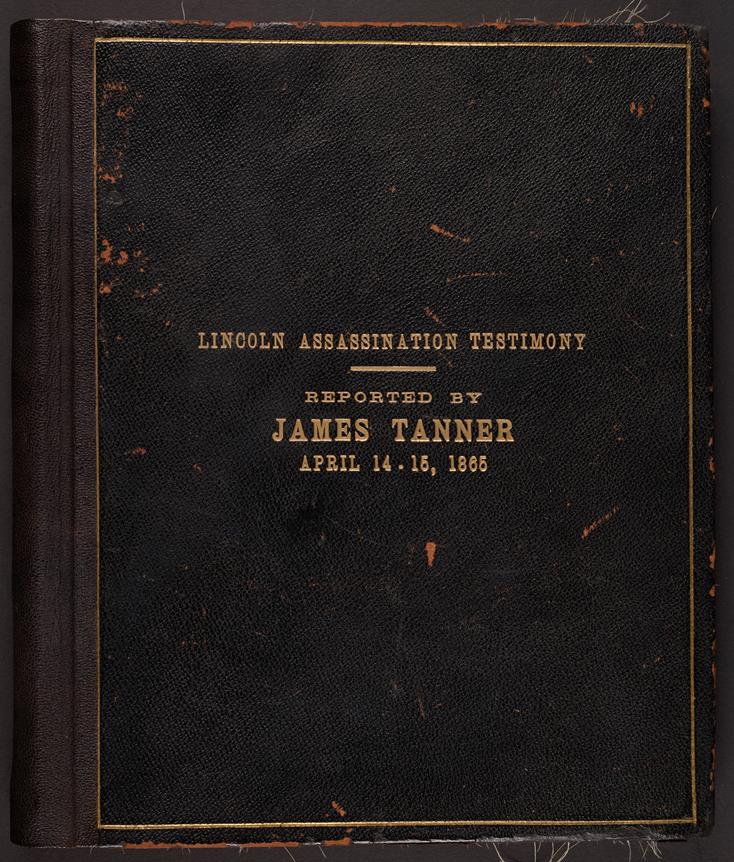
-
Description
In 1865 Corporal James Tanner was a disabled Civil War veteran working as a clerk in the Ordnance Bureau of the War Department and living in an apartment next to the Petersen House in Washington, D.C. On April 14th, President Abraham Lincoln was shot during a theatre performance at Ford’s Theatre. The mortally wounded President was taken to the Petersen House. Because he had stenography skills, Tanner was called into the Petersen House. While Lincoln lay dying in the bedroom, Tanner sat in the parlor and recorded eyewitness testimony as given to Secretary of War Edwin Stanton and David Kellogg Cartter, Chief Justice of the Supreme Court of the District of Columbia. The interrogation of the witnesses took place between midnight and 1:30 A.M. "In fifteen minutes I had testimony enough to hang Wilkes Booth, the assassin, higher than ever Haman hung" noted Tanner. While still in the parlor, Tanner transcribed his shorthand notes into longhand, finishing his task at 6:45 A.M. Tanner returned to his apartment and, dissatisfied with the quality of the first transcription, began a second copy which he left with an aide of Stanton's at his office in the War Department. Tanner retained the original testimony. The copy deposited at the War Department was lost. In 1905, Tanner’s son took his father’s first transcription and mounted each sheet on linen and bound them. In November 1917, as the Union League prepared to celebrate its 55th anniversary and dedicate the Lincoln Memorial Room, Corporal James Tanner wrote to UL President John Gribbell to offer his bound volume of testimony to the League’s collection: "believing that they are of considerable interest to the general public owing to the circumstances surrounding their creation and believing they will become more so as the years pass, I write to say that if you care to give the volume a place among the treasures you may now possess or may naturally gather in the future regarding President Lincoln, I shall be glad to present them to you in perpetuity, limited only to the life of the Union League." Digitization courtesy of the Schoenberg Center for Electronic Text and Image, University of Pennsylvania Libraries.
-
Source
The Abraham Lincoln Foundation of The Union League of Philadelphia (Object ID: XI.2.1917.2)
-
Rights
Use of this item for research, teaching and private study is permitted with proper citation and attribution, as “Courtesy of The Abraham Lincoln Foundation of The Union League of Philadelphia.” Reproduction of this item for publication, broadcast or commercial use requires written permission. For permission, please contact The Abraham Lincoln Foundation.
-
Creator
James Tanner
-
Date
April 15, 1865
-
Material
Paper, board, cloth
-
Dimensions
11" H x 9.5" W
from Apr. 19, 1865
Willie Clark to Ida Clark
-
Full Title
Willie Clark to Ida Clark
-
Description
Willie Clark, the Petersen House boarder who lived in the room in which President Lincoln died, wrote to his sister four days after Lincoln's death. He described the scene in Washington, including funeral preparations, the hunt for the killers, and, most notably, souvenir hunters who daily came into his room. Clark himself kept some souvenirs, and sent others to his sister.
-
Transcription
Washington, DC
Wednesday Monday April 19, 1865
Dear Sister Ida.
To day the funeral of Mr. Lincoln takes place, the streets are being crowded at this early hour. (9 A M) and the procession will probably not move for 3 hours. We are moved back into the old building (Cor. 15 1/2.) It having been repaired. Ladies are thronging in here now, I have moved my desk close to my window to secure its use for myself and friends.
The past few days have been of intense excitement. Arrests are numerously made, of any party heard to utter secesh sentiments. The time has come when people cannot say what they please, the people are awfully indignant. Leinency is no longer to be thought of. A new code must be adopted.
They talk of the tyranical administration of Mr. Lincoln, but we have a man now for a president who will teach the south a lesson they will know well how to appreciate.
Since the death of our president hundreds daily call at the house to gain admission into my room.
I was engaged nearly all of Sunday with one of Frank Leslies Special Artist aiding him viz making a correct drawing of the last moments of Mr. Lincoln, as I knew the position of every one present he succeeded in executing a fine sketch, which will appear in their paper the last of this week. He intends, from this same drawing to have some fine large steel engravings executed. He also took a sketch of nearly every article in my room which will appear in their paper. He wished to mention the names of all in the room particularly the pothographs of yourself, Clara and Nannie, but I told him he must not do that, as they were members of my family and I did not wish them to be made so public. He also urged me to give him my picture or at least to allow him to take my sketch, but I could not see that. either.
Everybody has a great desire to obtain some memento from my room so that whoever comes in has to be closely watched for fear they will steal something.
I have a lock of his hair which I have had neatly framed, also a piece of linen with a portion of his brain, the pillow and case upon which he lay when he died and nearly all his wearing apparel but the latter I intend to send to Robt Lincoln as soon as the funeral is over, as I consider him the one most justly entitled to them.
The same matrass is on my bed, and the same coverlit covers me nightly that covered him while dying.
Enclosed you will find a piece of lace that Mrs. Lincoln wore on her head during the evening and was dropped by her while entering my room to see her dying husband It is worth keeping for its historical value.
The cap worked by Clara and the cushion by you, you little dreamed would be so historically connected with such an event.
I received your letter but before I answer it I must see what I can do. With that exception I have not received any letters although you blame me for not writing when to my knowledge I have written four, and you must be aware I am very anxious to hear about mothers health which in your letter you did not mention.
I wrote auntie a letter about a week ago and enclosed a love letter to Ella promising to marry her when I get to be 21.
Remember me to Henry Littlefield. Tell him I shall write him soon. Remember to Mrs . Little and family and all enquiring friends.
Love to father mother
and Clara, and dont forget you have a brother and send me a longer note soon.
I will write again soon.
Your affe. Brother
Willie
Please not give away any of this lace, out of our own family.
Envelope addressed to Miss Ida F. Clark, No. 7 Warren Street,
Boston Mass.
-
Source
National Park Service, Ford's Theatre National Historic Site; transcription by Richard Sloan, Surratt Courier, April 1991
-
Rights
This item is in the public domain and may be reproduced and used for any purpose, including research, teaching, private study, publication, broadcast or commercial use, with proper citation and attribution.
-
Tags
-
Cite this Item
William Clark. "Willie Clark to Ida Clark". Remembering Lincoln. Web. Accessed October 31, 2025. https://rememberinglincoln.fords.org/node/707
-
Creator
William Clark
-
Date
April 19, 1865
from Apr. 19, 1865
Willie Clark to Ida Clark
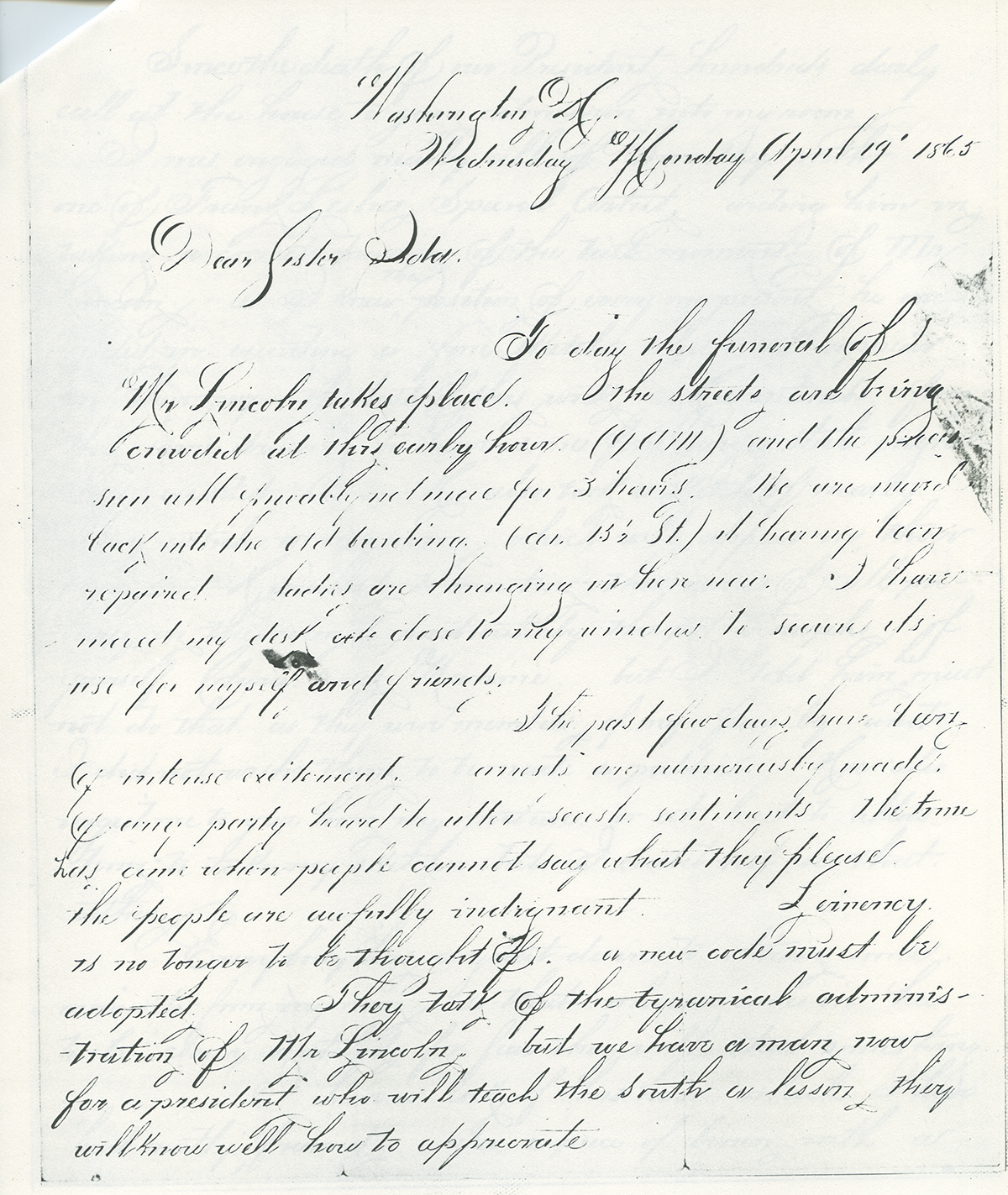
-
Description
Willie Clark, the Petersen House boarder who lived in the room in which President Lincoln died, wrote to his sister four days after Lincoln's death. He described the scene in Washington, including funeral preparations, the hunt for the killers, and, most notably, souvenir hunters who daily came into his room. Clark himself kept some souvenirs, and sent others to his sister.
-
Source
National Park Service, Ford's Theatre National Historic Site; transcription by Richard Sloan, Surratt Courier, April 1991
-
Rights
This item is in the public domain and may be reproduced and used for any purpose, including research, teaching, private study, publication, broadcast or commercial use, with proper citation and attribution.
-
Creator
William Clark
-
Date
April 19, 1865
from Apr. 16, 1865
Augustus Clark to S. M. Allen
-
Full Title
Letter from Augustus Clark to S. M. Allen, 16 April 1865
-
Description
This letter, written by Augustus Clark, a War Department employee, to his uncle, Stephen M. Allen of Woburn, Massachusetts, includes a firsthand account of the awful scenes at Ford's Theatre in Washington, D.C. after John Wilkes Booth had shot Abraham Lincoln. Clark also describes what he witnessed at Petersen's boardinghouse across the street from the theatre, where Lincoln died.
-
Transcription
[Page 1]
Ordnance Office, War Department Washington, April 16 1865
Dear Uncle [S. M. Allen ]
You have of course heard all the particulars of the
dreadful death of the President on the 14th inst But as
I was an eye Witness of the latter part I will endeavor to explain
matters. At 10¼ Oclock I was looking out of a window of
a house opposite the theatre and seeing a large excited crowd
rush from it I thinking some one might have been robbed
ran down stairs and across the street into the theatre and then
heard the awful words, "Lincoln is shot"—I sprang off towards
the stage over the seats every one being in the wildest commotion
and on reaching it saw a lady reaching over the right
hand box second tier it was the daughter of Senator Harris of
N.Y. I clambered up seized her hand and drew myself into
the box and there on the floor lay Abraham Lincoln dying:—
his wife near him shrieking and moaning, Major Rathburn
and a few others near by. Several of us lifted him and
carried him out to the street and finding his carriage gone
I said "take him across the street" he was carried into the
house I had just left, and deposited on a bed, his clothes
[Page 2]
stripped off:— he was shot in the head on a line with the
left ear about 2 inches towards the back of the head,
the Ball was round and entered about three inches in a
line towards his right eye—he was breathing very heavily
and his pulse fluctuated from 105 to 42 in about three hours.
The blood soon begun to settle under his left eye and blackened
the whole side of his face. Mrs Lincoln soon came over and
was hardly sane all night and is now quite low, Laura
Keene came over with her but did not stop—his [son] came in
about Eleven and was much agitated. Soon all the members
of the Cabinet rushed in with grief and terror depicted on
their faces: many Senators and members arrived during the
night—the street was cleared of all strangers and a great
military force stationed around the square. Stanton was there
issuing orders to all parts of the union and seemed to
do most of the business. news came about eleven that Seward
was fearfully stabbed and it seemed to strike terror into the
hearts of all. Maj. Rathburn was wounded badly in the arm and
fainted twice before his wound was dressed and he got home.
Mrs Lincoln came into the room seven times during the
night and felt dreadfully she fainted twice and fell over onto
the floor. I remained in the room all night long and did
all I could to help. The best surgeons were there but no
[Page 3]
attempt was made to extricate the Ball as he was pronounced
fatally wounded at first examination he lingered
on 'till seven twenty "AM" when he breathed his last in
presence of the members of the Cabinet several senators
and others. Mrs Lincoln was not in the room at the time of
his death. The body at nine oclock was taken to the White
House and has been embalmed. I got a lock of his
hair and a towel saturated with the blood of the best
man that ever was President and a friend of the south.
They now have a President that will show them no mercy
and they deserve none. I will enclose a piece of the towel
for you as a relic.
The folks are all well and hope this
will find you family the same. Give my love to all
and excuse this writing as it is quite late and I am
very nervous.
I am as Ever Yours Truly
Gussie
-
Source
Massachusetts Historical Society, Special collections, manuscripts
-
Rights
Use of this item for research, teaching, and private study is permitted with proper citation and attribution, as: From the Collection of the Massachusetts Historical Society. Reproduction of this item for publication, broadcast, or commercial use requires written permission. For permission, please see this web page.
-
Tags
-
Cite this Item
Clark, Augustus. "Letter from Augustus Clark to S. M. Allen, 16 April 1865". Remembering Lincoln. Web. Accessed October 31, 2025. https://rememberinglincoln.fords.org/node/287
from Apr. 16, 1865
Letter from Augustus Clark to S. M. Allen, 16 April 1865
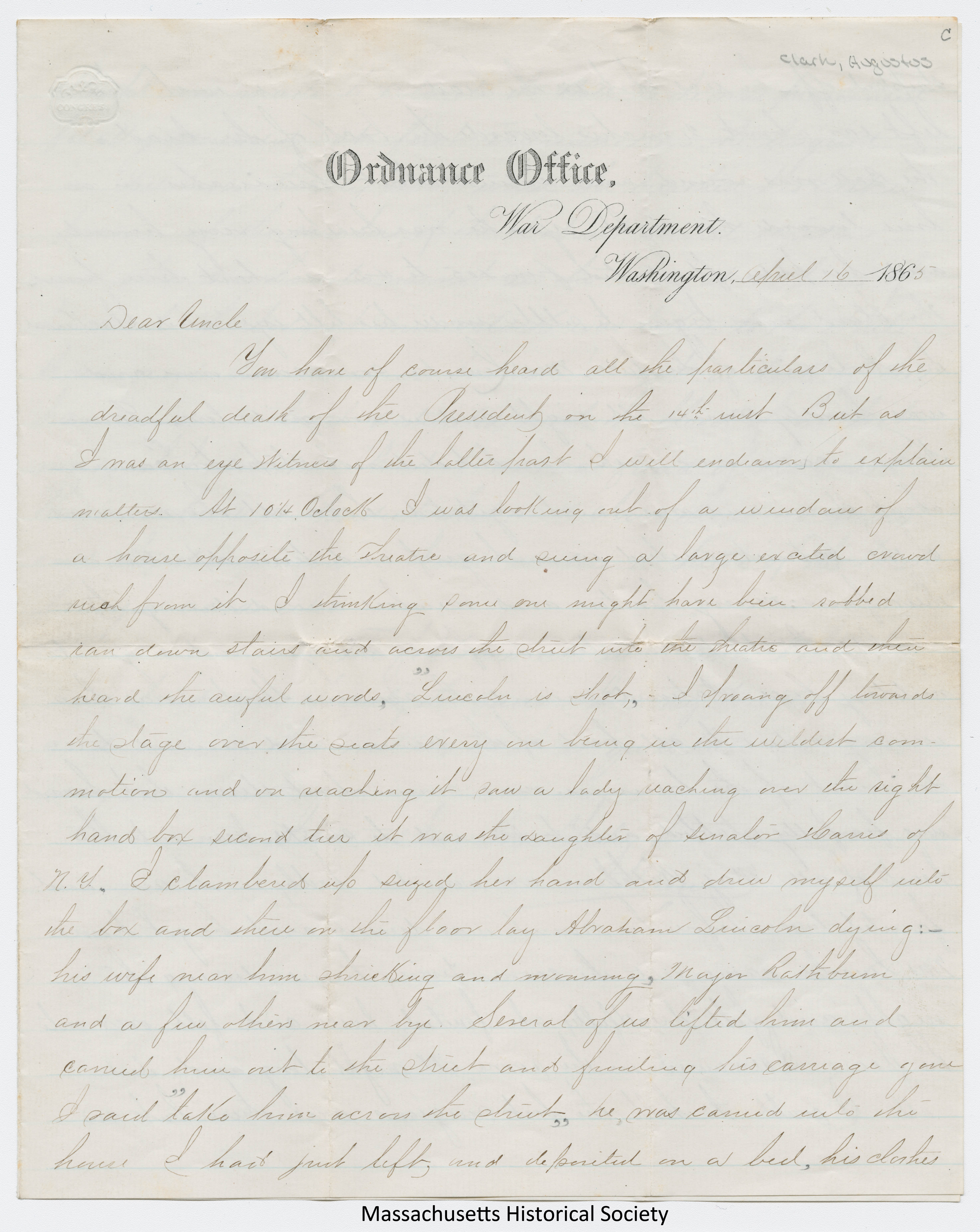
-
Description
This letter, written by Augustus Clark, a War Department employee, to his uncle, Stephen M. Allen of Woburn, Massachusetts, includes a firsthand account of the awful scenes at Ford's Theatre in Washington, D.C. after John Wilkes Booth had shot Abraham Lincoln. Clark also describes what he witnessed at Petersen's boardinghouse across the street from the theatre, where Lincoln died.
-
Source
Massachusetts Historical Society, Special collections, manuscripts
-
Rights
Use of this item for research, teaching, and private study is permitted with proper citation and attribution, as: From the Collection of the Massachusetts Historical Society. Reproduction of this item for publication, broadcast, or commercial use requires written permission. For permission, please see this web page.
-
Creator
Clark, Augustus
-
Date
April 16, 1865
-
Material
25 cm x 20 cm

